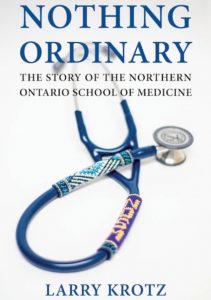Where there is smoke, is there a fire?
Posted on July 27, 2021
It was late Sunday late afternoon in Sudbury, I was reading a book on my balcony and warm hazy air began wafting over my vista. In the distance I saw grey clouds. The smell of fire began embracing the breeze. Quickly the air became thick and unbreathable, and I felt the onset of a migraine and chest wheeziness. The jet stream had picked up and the effect of forest fires were being felt across Northern Ontario. I had heard about this in the Northwest, in BC, and Alberta but it doesn’t feel real until it hits close to home. Climate change is no small matter. The reports of flash flooding in Europe, devastating scenes of forests being decimated in the world, and the bizarre tornadoes, sandstorms and global warming are signals that the impact of climate change on health is immeasurable.
On Monday, I listened to the speech by Mary Simon as she became Canada’s 30th—and first Indigenous—Governor General. Her appointment is a historic and inspirational moment for Canada, and an important step forward on the long path toward reconciliation. Her speech spoke to the issues of truth and reconciliation and to the care of our planet when she said: “I believe we can build the hopeful future in a way that is respectful of what has happened in the past. It means supporting the well-being of people by focusing on our youth, and in improved educational outcomes for all of our children. It means prioritising the protection of our natural world, so that we can have a healthy climate and planet for generations to come.”
As we continue the journey to becoming a stand-alone, degree-granting university, we have engaged in a process of transitional planning and ensuring continuity with the maintenance of ongoing relationships. We expect the NOSM University Act—which received Royal Assent on June 3, 2021—to be proclaimed in force by early fall. The issues of planetary health and the legacy of colonialism will be forefront, with our attention to equity, racism and social accountability as NOSM University. I too, believe we can build a positive future for Northern Ontario through this process.
The NOSM University Transition Team is charged with the oversight of the evolution from the Northern Ontario School of Medicine to NOSM University, and across the school many people are involved. Importantly, the relationship agreement with Laurentian University and Lakehead University remains in place while we discuss ‘bridging’ some of the tasks that may migrate to NOSM University once the Act is proclaimed in force. Until then, our current relationship with Laurentian and Lakehead remains unchanged. I have been reassured by the ongoing meetings reflecting the collaboration between NOSM and the universities.
Our main priority is the well-being and support for our students. With that in mind, we have a newly established Registrar’s Office, under which all enrolment services (admissions), learner support services (learner affairs, accommodations and accessibility), records and convocation services will be housed. I am pleased to announce three key interim leadership roles: Miriam Cain will be the first Registrar, Sherry Mongeau is the new Director of Learner Support Services, and Katie Biasiol takes on the role of Director of Admissions. There will be formal searches for these positions once we have the structures in place. As this new unit is being established, I have asked the team to start consultations with affected stakeholders and to organise a whole-school process to ensure the needs of the future University will be met.
In late fall, I will be leading an extensive consultation and engagement process. I’m looking forward to speaking with many of you about the vision for NOSM University. Pandemic rules willing, I plan to be on the road making in-person visits and gathering input and your views on what NOSM University will look like. I plan to have meetings with key partners including municipalities, hospitals, universities, a Social Accountability Advisory Group, Academic Council, the Indigenous Reference Group, Francophone Reference Group, NOSM faculty, students, staff and alumni. We will also reach out to our supporters, including donors, Local Education Groups and the Northern Ontario Academic Medicine Association. Members of the public will also be invited to join townhalls, so stay tuned.
We will collect ideas through an online survey. It’s important to me that we hear from as many NOSM community members as possible. Updates on the consultation process and our progress in transitioning to a stand-alone university will be shared through media, on the NOSM website, and via social media (Twitter, Facebook, Instagram, and LinkedIn).
Meanwhile, we will prepare for the post-proclamation phase of our transition, which will focus primarily on our new Board of Governors and Senate. This is our opportunity to talk about the skills needed to govern a new Northern University and to do so in a world focussed on equity, diversity, decolonialization and reconciliation.
Finally, empowering and building leadership for all the important changes is critical. So, to quote Mary Simon again… “Please know that we need more of your voices and perspectives in leadership positions across this country. I hope you use my appointment to believe, with increased conviction, that anything is possible….I can’t wait to roll up my sleeves to embark on our work together, and may wisdom and compassion guide our efforts.”
Thank you to all who are occupied with fulfilling our social accountability mandate. I am happy to roll up my sleeves and work alongside you.
Miigwetch, thank you, marsi, merci,
Dr. Sarita Verma
Dean, President and CEO
Northern Ontario School of Medicine
If you have any feedback or comments, please reach out at dean@nosm.ca and follow me on twitter @ddsv3.

Enjoy the summer
It was great to hear from you after I shared my favourite things to do, see, eat and hear this summer! I appreciate these notes immensely. Dr. Pabani recommended reading Braiding Sweetgrass by Robin Wall Kimmerer. I also received a photo from Carole of her son and adorable granddaughter enjoying the beautiful weather.

CampMed a resounding success
CampMed—NOSM’s annual summer camp—inspires youth to consider a future as a health-care professional. CampMed provides youth in Northern Ontario and other rural and remote areas of Canada with an opportunity to explore Indigenous and Francophone culture, health and traditions, health-care careers, obtain hands-on experience, and find a mentor. Hosted this year from July 12 – 23, CampMed was a resounding success with record-high participation.
- 33 Workshops (21 live, 3 pre-recorded, and 9 career pathway videos)
- 235 youth participants
- 60 volunteers (18 NOSM Medical student volunteers, 27 university volunteers, and 15 guest speakers)
- 64 communities (including Atikokan, Balmertown, Chapleau, Fort William First Nation, Iroquois Falls, Kenora, Manitouwadge, Mindemoya, and White River.)
 Nothing Ordinary: The Story of the Northern Ontario School of Medicine
Nothing Ordinary: The Story of the Northern Ontario School of Medicine
Written by author Larry Krotz, Nothing Ordinary tells the story of how 800,000 citizens created their own school of medicine. Over the course of nearly twenty years, NOSM has created a legacy of a school that is far from ordinary. Scheduled for publication in October 2021, Nothing Ordinary is now available for pre-order.
 NOSM students receive Indigenous Learner Leadership Award
NOSM students receive Indigenous Learner Leadership Award
Mélanie-Rose Frappier and Alison Lewis, both fourth-year medical students at NOSM, are the inaugural recipients of newly established CIBC Indigenous Learner Leadership Awards. The awards recognize self-identified Indigenous learners who demonstrate exceptional leadership and mentorship within the School and community. Learn more.
 Helping close the gap on psychiatry shortages
Helping close the gap on psychiatry shortages
Dr. Zoe Michano-Furlotte, NOSM alumna, completed her fourth year of residency in psychiatry in Thunder Bay and is entering her fifth and final year. Zoe is a member of Biigtigong Nishnaabeg and is from the town of Caramat. She says there is a need for the province to ramp up increased funding and psychiatric care. Read more.

